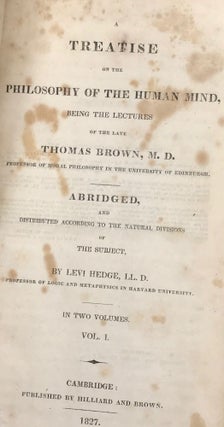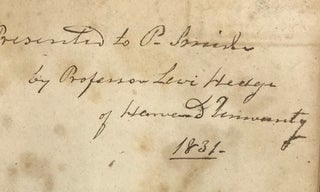A TREATISE ON THE PHILOSOPHY OF THE HUMAN MIND, Being the Lectures of the Late Thomas Brown, M.D....Abridged, and Distributed to the Natural Divisions of the Subject.
Cambridge, [MA]: Published By Hilliard and Brown, 1827. Two volumes. First edition. 8vo. 23 cm. xi, (blank), 454; vi, errata, (blank), 379pp. Contemporary three quarter brown calf and marbled boards, rebacked with two gilt stamped leather spine labels on each volume. Printed booksellers ticket of Hilliard & Brown, Booksellers to the University, Cambridge, N.E., on the front pastedown of vol. one, and the bookplate of Preserved Smith in both volumes. Page toning and scattered foxing throughout. Ink presentation inscriptions in each volume, dated 1831, from Levi Hedge, to Preserved Smith, possibly in the recipient's hand.
Preserved Smith (1801-53), graduated from Amherst before attending Andover Theological School, 1828-31, serving as a clergyman in New Hampshire and Massachusetts. Daniel Walker Howe (The Unitarian Conscience) has demonstrated how Scottish common-sense provided the philosophical underpinnings of Harvard Unitarianism and how this became the establishment philosophy of New England and beyond. As professor of logic and metaphysics at Harvard post 1810, Hedge was a strong advocate of Scottish philosophy: he "moved the college away from [the Logick of] Watts more toward the Scottish logicians." [see: R. Kennedy (ed.), "Aristotelian and Cartesian Logic at Harvard," (Boston: 1995)]. Indeed, Hedge's own Logick was "the definitive presentation" of the Scottish philosophy as understood at Harvard. Benjamin Rand, in his article "Philosophical Instruction in Harvard University from 1636 to 1906," [Harvard Graduates Magazine: 1928], adds that "the introduction of the Scottish philosophy chiefly characterized the progress of philosophical thought at Harvard during the first half of the nineteenth century. The devotion of Professor Hedge to the Scotch school is particularly revealed by the fact that he made an abridgement of Brown's "Philosophy of Mind" [Cambridge, Mass. 1827, 2 vols] for the use of his students." Item #64502
Price: $600.00



